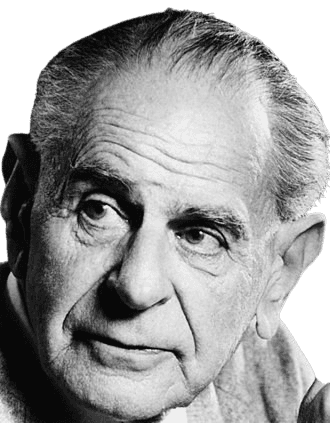Life and achievements
Early life
Karl Popper was born in Vienna, Austria, on July 28, 1902, to middle-class parents who were educators. His father was a lawyer and a keen book lover, and Popper grew up amid books on philosophy, science, and the humanities. His mother, Jenny Schiff, was a pianist and saw him through his early education years, bringing an artistic bent to his otherwise intellectual childhood.
From childhood, Popper was attracted to philosophy, encouraged by his father's collection of books and people he met in Vienna. He heard lectures in mathematics, philosophy, and psychology at the University of Vienna and was a part of the interwar Vienna intellectual movement along with Sigmund Freud and Albert Einstein.
Interestingly, despite some of the themes in Popper's early teenage years, including Marxism, his interest was brief. He left the Marxist doctrine in 1919 when he saw police shooting dead several unarmed people during a conflict between police and leftist demonstrators. This experience made him turn away from the political extreme and paved the way for formulating his anti-historicism outlook on history.
Popper finished his doctoral thesis in psychology under the mentorship of Karl Bühler in 1928, and his early works focused on the philosophy of mind and education.
Legacy
Karl Popper's philosophy influenced not only the field of science but also political philosophy. His concept of falsifiability profoundly impacted the scientific method and how scientists and philosophers of the new era would approach the business of science. Popper's contribution to scientific research may be colossal, especially in abolishing induction to establish scientific laws.
That science advances through conjecture and refutations remains an unchallenged orthodoxy from him. In this way, through critical rationalism, Popper introduced new perspectives on how knowledge is generated, assessed, and developed.
In political philosophy, Popper's works are still significant, especially his advocacy of liberal democracy and his strong condemnation of totalitarianism. His best-known work, The Open Society and Its Enemies posited that societies are successful when they are receptive to feedback and evolution and that Marxist or fascist ideologies are based on erroneous historical materialism.
Popper's stress on the role of freedom, reason, and democracy and the rejection of totalitarianism has been appreciated by political scientists, politicians, and democrats.
A positive mark of Popper was also in other spheres, such as in popular science and education. Such personalities adopted his ideas, such as George Soros, who used Popper's point of view on open society in his charitable activities.
Consequently, Popper's works remain well worth discussing regarding science, politics, and society, especially in the modern world, where the differences between science and pseudoscience and democracy and authoritarianism are not always clearly defined. Popper died in 1994, but his ideas are still important for today's discussions on the objectivity of science, political liberty, and the search for truth.
Milestone moments
Jun 4, 1934
Publication of The Logic of Scientific Discovery
In 1934, Popper published The Logic of Scientific Discovery, in which he first expounded the principle of falsifiability.
This work rejected the positivist idea of science, saying that scientific theories must be refutable rather than confirmable.
The book brought a radical change in the philosophy of science.
It positioned Popper as one of the most influential scientists of the twentieth century and the founder of the future methodology.
Mar 7, 1945
Publication of The Open Society and Its Enemies
In 1945, he published The Open Society and Its Enemies, a work critical of the philosophical basis of totalitarianism.
The book was a critique of the modern world and, more specifically, of liberal democracy against historicism.
It claimed that societies should remain open to change and discussion rather than be bound by the belief of an inevitable history.
In this work, Popper became recognized as a political philosopher and helped with the intellectual battle for democracy after the Second World War.
Oct 11, 1946
The story of joining the London School of Economics
In 1946, Popper joined the LSE as a Reader in Logic and Scientific Method, which enabled him to shape a generation of philosophers and economists.
While working at the LSE, Popper cooperated with such giants as Karl Mannheim, Michael Polanyi, Friedrich von Hayek, and others; his ideas on critical rationalism and the method of science were widely recognized.
At LSE, he established himself as one of the premier philosophers of science and political thought in the twentieth century.
Jan 17, 1959
The 'Logic of Scientific Discovery' English translation
Presumably, Popper's work The Logic of Scientific Discovery was translated into English in 1959.
The translation contributed to sharing his theory of falsifiability with scholars in other parts of the world, particularly in English-speaking countries.
This became a significant achievement, showing that Popper's philosophical works had gone international and establishing his standing in the history of philosophical thoughts of science.
